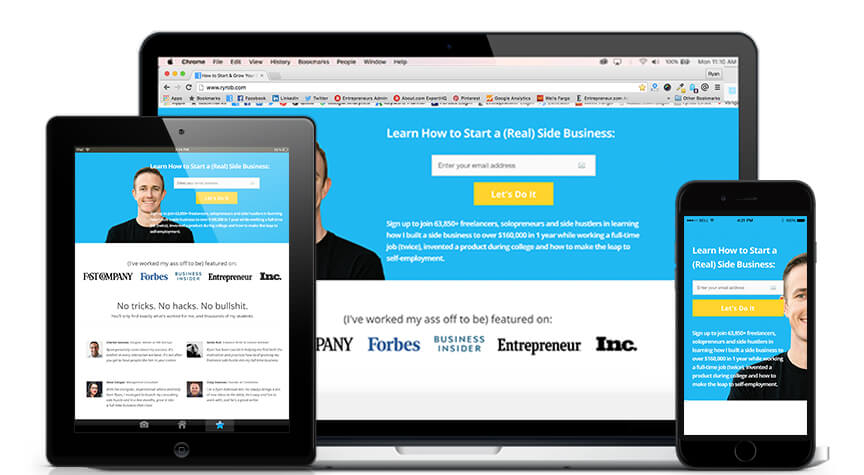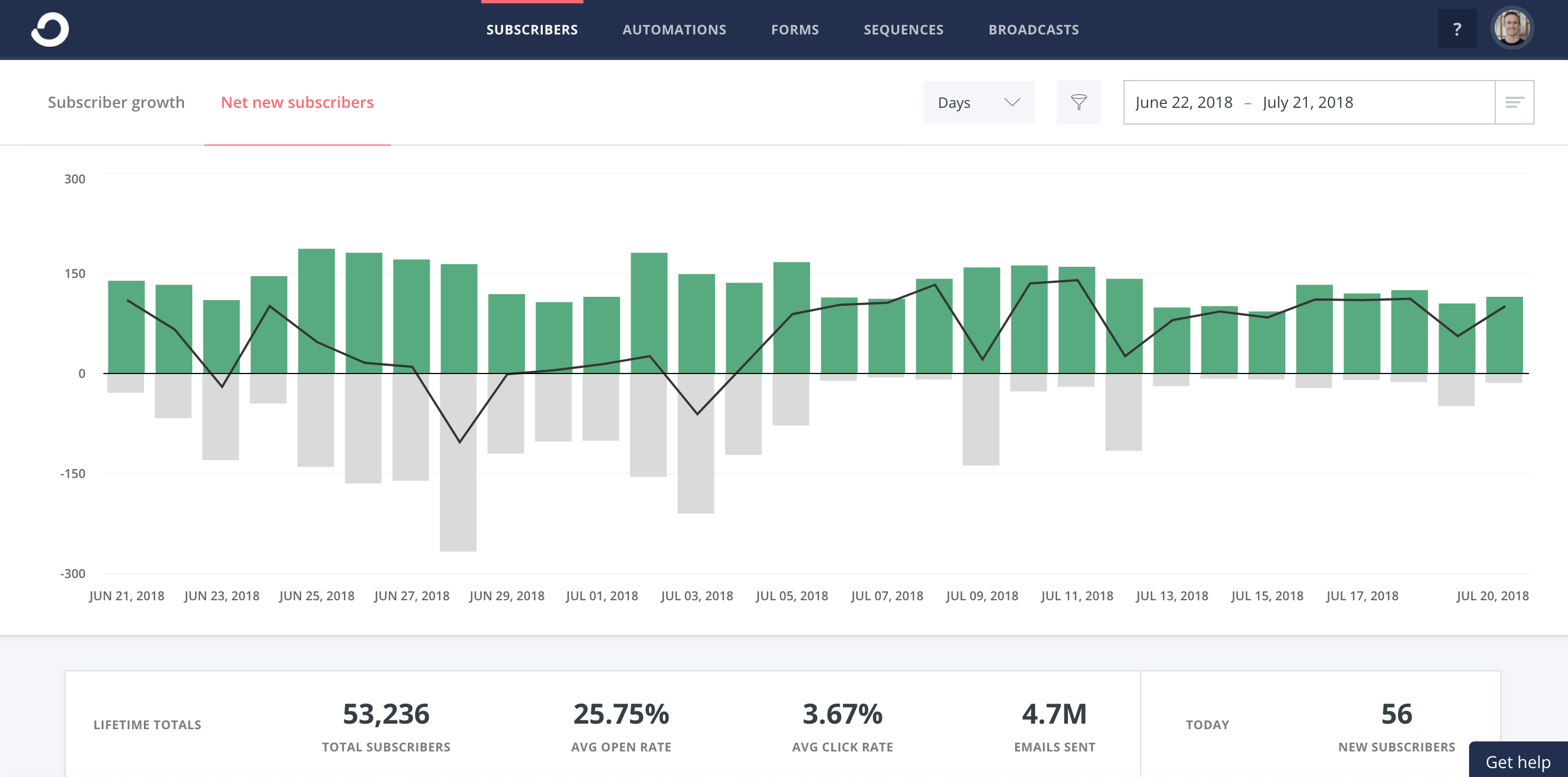As a small business owner, you’re always looking for ways to maximize your productivity, and use the best tools possible. There’s so much out there, though—and not always a lot of time to research which tools might be right for you.
That’s why we’ve compiled this list. Here are the best free online business tools for small business owners in 2018.
Table of Contents
Best Free Online Business Tools
1. WordPress.
In my opinion, having a WordPress hosted website backed by the right monthly hosting plan is the absolute best balance between easy-to-setup website and scalable platform for future growth, especially if your online business model shows early positive growth signs. If you’re new to setting up a visually appealing website, there are an incredible amount of online blogging courses, tutorials, and free resources that can teach you how to get started with WordPress. I also put together one of the most in-depth guides on how to start a blog (that covers everything ranging from how to come up with winning blog post ideas, to effective ways you can drive traffic to your blog and actually learn how to make money blogging).
The free, simple to use Content Management System (CMS) that WordPress gives you is a basic website, published on one of their free default WordPress theme templates in a matter of minutes. For more creative control and advanced features that you’ll eventually want to use for your online business, you’ll want to pick up more complex themes and plugins.
2. Bluehost.
While I’ve since moved on to using Kinsta to host my blog now that I get millions of readers, Bluehost is where it all got started. Their hosting plans are some of the most affordable you’ll find online, ranking them amongst the cheapest hosting plans on the market—starting at just $2.95/mo with a variety of different plans to suit your unique and growing needs. Whether you’re starting your first website or you just want to get your online business up and running quickly, Bluehost is my pick for the quickest & easiest web hosting provider, though there are plenty of other best hosting plans to consider today. On top of just hosting, they also give their customers access to 24/7 expert support to help with any questions, troubleshooting, and customization issues you have as you get going. Plus, they back all of their hosting plans with a 30 day money back guarantee. You can get started right here.
3. OptimizePress.

OptimizePress is one of the best WordPress themes for creating conversion-optimized websites, and it’s what I use to power my online business as the website builder behind-the-scenes on this blog. The amazingly simple visual live editor and template library enables you to very quickly build high converting landing pages, make a website, construct member portals, offer gated content, and so much more at an affordable price point.
As an added bonus, all of the pages you’ll create with OptimizePress are automatically fully responsive, so they’ll display perfectly on mobile & tablets—a major consideration when designing your blog layout. The theme is regularly updated with new features, functionalities, and has an amazing support team to answer any questions you have once you get started. On top of that, the theme plays very nicely and has direct integrations with all of the other top online business tools on the market, which makes seamlessly running your business a breeze.
4. ConvertKit.

A huge part of getting traction with any online business is building your email list and learning to do email marketing. Your subscribers are one small step away from becoming customers, and they’ll serve as your first group for testing new products, sharing helpful insights, and launching new features. I’ve used several different blogging tools for managing my list, but ConvertKit is my all-time favorite. Their functionality is designed specifically for solopreneurs, bloggers, small business owners, and they’re constantly creating new features with these users in mind.
It’s very affordable (starting at $29/mo) and comes with every feature you need to build lists, quickly generate high-converting landing pages, set up automated emails, message subscribers, and includes numerous helpful email templates to start with. It also integrates directly with WordPress and dozens of other important tools for online business owners, so you can easily install visually appealing opt-in boxes and capture leads. If you want to take your email marketing seriously, check out ConvertKit today, it’s by far my most essential online business tool. Check out this comparison of ConvertKit vs AWeber vs Mailchimp to see for yourself.
5. Shopify.
My very first online store ran on Shopify (one of the top eCommerce website builders on the market today). Beyond just their easy-to-build online business storefronts that you can host on your own custom domain, they’ve released a suite of other online business tools and integrations that allow you to sell your products directly on Pinterest, Twitter, Facebook, and you can even embed shopping carts directly into your existing website. But if you’re still looking for the right blog name ideas, then try out a smart domain name generator that can help you land on a great name for your niche.
With low monthly and per-sale transaction fees on top of a free trial, Shopify is a great option for selling products online without going through the complicated process of custom-building an online store directly into your website.
essential tools for online business

10 Essential Tools to Start Your Online Business
There are a ton of tools out there to make your life easier as an online entrepreneur. Some of these items will be more helpful than others, so we’ve narrowed it down to the 10 most essential must-haves for starting an online business. This list includes everything from software and hardware to tools that you can use in your day-to-day operations.
1. Computer or Laptop
Having a computer or laptop is essential for online businesses because you need to be able to access the internet and your business files from anywhere. A laptop also gives you the flexibility to work from any location, which is great for entrepreneurs who are always on the go.
Also, you’ll need a reliable computer to run useful software for various business tasks such as email marketing, word processing, blogging, website building, and more.
Chance are you already have one so that’s something you don’t have to spend on.
2. Internet Connection
Having a reliable internet connection is essential for online businesses because it allows employees to connect with clients and customers. It also allows employees to access important files and documents. In addition, a reliable internet connection allows businesses to stay connected with their customers and clients.
Depending on the quality of your internet connection, you may need to have multiple subscriptions from different service providers to make sure that you are always connected.
3. Smartphone
Smartphones are great for running a business because they allow you to stay connected to the internet and your customers no matter where you are. You can use your smartphone to take pictures of your products, answer customer questions, and even process payments.
If you’re starting an online business, it’s important to have a high-quality camera so that you can capture great images and videos of your products and services. Customers will be more likely to trust your business if you have professional-looking photos and videos.
A higher-end smartphone can be enough to produce high-quality images and videos.
4. Design Software
Whether it’s Photoshop, Illustrator or Canva, using a program for your marketing promotions can be helpful. Canva is a graphic design software that is very user-friendly and versatile. You can use it to create professional-looking graphics for your website, social media accounts, and marketing materials. In addition, Canva offers a wide range of templates and tools that make it easy for beginners to get started.
Many entrepreneurs don’t have the budget to purchase expensive graphic design software. Fortunately, there are a number of free options available online. Some of the most popular free graphics design software programs include Canva, GIMP, Inkscape, and Scribus.
5. Website
WordPress is an excellent platform for creating a business website because it is user-friendly and versatile. You can use WordPress to create a website that looks professional and meets your specific needs. WordPress also offers a wide range of plugins and themes that make it easy for beginners to get started.
6. Google’s Business Suite
Google’s Business Suite is an extremely helpful tool for business owners. It allows you to manage your email, calendar, and contacts in one place. This makes it much easier to stay organized and efficient. In addition, the Business Suite also includes a number of other helpful tools such as Google Docs and Sheets.
7. Accounting Tools
Accounting software is an essential tool for businesses because it allows entrepreneurs to keep track of their finances. This software makes it easy to create invoices, track payments, and generate reports.
8. Email Marketing Software
Email marketing software is important for online businesses because it helps entrepreneurs to stay connected with their customers and clients. This software allows you to send out emails promoting your products or services, and it also allows you to track the results of your email campaigns so that you can see what’s working and what’s not. Additionally, email marketing software can help you to create beautiful email newsletters that will capture the attention of your readers.
9. Customer Relationship Management (CRM)
CRM software helps businesses to manage their customer relationships. This software allows entrepreneurs to track the contact information of their customers, as well as the interactions that they have with them. In addition, CRM software can help businesses to generate reports on their sales and marketing efforts. This information can be used to improve future marketing campaigns and sales strategies.
10. Social Media Management Tool
Social media management tools help you manage your social media accounts more efficiently. Some of the features that you should look for in a social media management software program include:
– Scheduling posts- Analyzing metrics- Responding to comments and messages- Tracking brand mentions-Creating reports
The best social media management software programs also offer team collaboration tools so that you can work with other employees on your social media accounts.
It’s also important to find a software program that is compatible with the devices and platforms that you use.
Tools allow you to focus on more important aspects of your business such as business development, operations, people management, and eventually, expansion. The more time you save doing repetitive tasks, the more time you have growing your enterprise.
Conclusion
Let us know your thoughts in the comment section below.
Check out other publications to gain access to more digital resources if you are just starting out with Flux Resource.
Also contact us today to optimize your business(s)/Brand(s) for Search Engines
